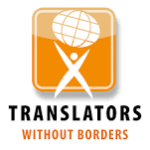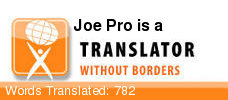
Pieter Beens is a freelance translator and copywriter working in English to Dutch, and a frequent guest contributor to the Translator T.O.
In this post, Pieter shares his experience as a volunteer translator for Translators Without Borders.
I just completed a translation for Translators Without Borders, my fourth this year. And I must admit I was touched. This time I translated for a charity that helped orphaned children get back to school after the Ebola outbreak last year. Such a beautiful initiative needs our support. I did my small part by translating their sponsoring letter into Dutch, and hope that the letter will help raise the funds necessary to bring these children back to education. That is why I chose to register as a volunteer for Translators Without Borders a couple of years ago, and why I have already translated more than ten thousand words through this organization for several different charities. And there are many more volunteer translators doing the same, donating their time and effort towards helping various other charity initiatives that deserve support. Through Translators Without Borders, we have already translated 30 million words for a multitude of audiences in almost every country in the world.
About Translators Without Borders
Many of us know Doctors Without Borders, an international organization offering worldwide medical support in the event of humanitarian crises and other urgent situations. In 1993, two pioneers in the translation industry founded a linguistic equivalent of it, Translators Without Borders, aimed to link translators around the world to vetted NGOs that focus on health, nutrition and education. Today the platform is affiliated to ProZ.com and sponsored by many translation agencies worldwide. Translators Without Borders offers them a chance to share their knowledge and resources in order to help the needy, while at the same time sponsoring can show off their social responsibility. The translation agencies do not necessarily offer translations, but they offer funding. Translations are done by professionals who voluntarily sign up to offer their help to organizations in need of translations in their language  pairs.
pairs.
Registering to volunteer your services through Translators Without Borders does not mean you are obligated to accept every project that comes your way through this organization, nor does it necessarily guarantee that projects will be passed to you. As you can imagine, the demand for volunteers varies greatly depending on language pair and pool of available candidates. Indeed, there is a very high demand for professionals working in certain pairs, and less demand in other pairs. There may also be many translators volunteering in some language combinations, and far fewer volunteers available in others.
Why choose Translators Without Borders
Last year I wrote about five reasons to translate for charities and tips for supporting charities as a translator. Translating for Translators Without Borders can be seen as a part of my commitment to offer my professional services to organizations that support those in need. At the same time, Translators Without Borders does not require a huge commitment. In my language pair (English into Dutch) requests are sent irregularly, from organizations like Wikipedia, street newspapers, and the International Red Cross. The nature of translation tasks varies from interviews, to fundraising letters and other important information about diseases like the Zika virus, for which I recently translated a text.
In general, project deadlines can be fairly long; in many cases the deadline for a text with 500 words may be around 10 days, while the deadline for texts with 2000 words can even be 30 days. That enables translators to focus on their important tasks and to do volunteer tasks in their own pace. After having delivered the text many clients often leave gracious feedback, knowing that without our help it would have been much more difficult to reach local audiences in their local languages.
In short, volunteering for Translators Without Borders is a rewarding opportunity that enables freelance translators to use their professionalism and passion for a higher goal. I highly recommend it!
Did you know?

Members of ProZ.com’s Certified PRO Network do not need to undergo any additional screening process to join Translators Without Borders’s team of volunteers.
You can learn more about this initiative and apply for inclusion in the program here: http://www.proz.com/pro-tag/info/about/

